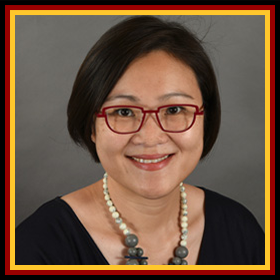By Cheryl Ching, Assistant Professor, University of Massachusetts, Boston
I can’t remember the first time I met Tatiana. It was probably sometime in 2012, the year I started the PhD program at USC Rossier. The last time I saw her was during our final project meeting of 2023, in November. During this time, I was fortunate to experience Tatiana in different ways.
Tatiana was my teacher for causal methods in the summer of 2013. That class was not a joy; my thoughts about it could be politely expressed as: “This is for the birds.” Between the headaches, however, I recall Tatiana saying that her pedagogical goal was for us to develop our “intuition” for quasi-experimental analysis. To my surprise, I actually developed some causal intuition: in my research design class this semester, I was able to explain — with confidence! — the idea behind regression discontinuity designs and how RD studies such as the ones Tatiana did were vital to reforming placement policies in community colleges.
Tatiana’s scholarship was essential for my learning about community colleges and for my dissertation study. Importantly, her work helped me understand how developmental education and transfer structures impact student outcomes and, in turn, shape the context in which practitioners make meaning of “equity.”
After I transitioned to faculty life, Tatiana became my PI for a research-practitioner partnership (RPP) project with the Los Angeles Community College District on California Assembly Bill 705. Tatiana was convinced about AB705’s import for placement and developmental education reform in LACCD and the need to use quantitative and qualitative methods to understand its impact and implementation. We wrote several proposals to support the RPP, most of which were rejected. Tatiana seemed unruffled by rejection; rejection simply represented another opportunity to sharpen our arguments, refine our research design, and find a funding partner who believed in our project as much as we did. That partner turned out to be the Spencer Foundation, which awarded us an RPP grant in 2020.
My professional life expanded through the RPP work in predictable and unpredictable ways. Unsurprisingly, my understanding of developmental education and reforms impacting community colleges deepened. As expected, I got to know the LACCD practitioners involved in implementing AB705 and learned how the policy was (re)shaping their work and the lives of their students. And, as anticipated, my research skills and intuition sharpened.
What I did not foresee were the things I learned from observing how Tatiana worked — how she mentored by doing. Watching her in research team meetings and in meetings with the district — particularly, how she positioned her LACCD team Federick, Elise, and me — I saw her fostering the conditions for collective leadership. Tatiana was undoubtedly the senior, most experienced researcher on the team; however, from what I saw, never did she expect her perspective to matter more, never was a decision solely hers, never did she convey that she had all the answers. She expected us to step up, to bring our best thinking and effort, and on days that we couldn’t, that was OK too.
Almost all of Tatiana’s work was with the colleges in LACCD. Her commitment and fidelity to one place have struck me as extraordinary in a field where researchers (myself included) spread themselves across multiple partners and research sites. Doing good research mattered to Tatiana, but what seemed more important to her was doing research that mattered to the people in LACCD and that could be used to enhance students’ experiences and outcomes.
In my memory, Tatiana never answered nor sent emails in the evenings or on the weekend. She seemed to have clear boundaries between her work and personal lives; there were times when we could expect her attention, and there were times when we knew not to. Seeing Tatiana do this gave me permission to organize my time and priorities differently than what I learned as a graduate student. How she worked legitimized the idea that being a faculty member doesn’t have to be, and shouldn’t be, an all-consuming occupation.
Tatiana, thank you for everything and may perpetual light shine upon you.
All my love, Cheryl








